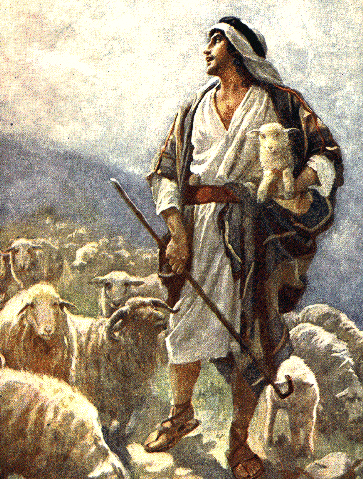The destiny of the saint is to be a king or a priest in the millennium under King Yeshua the Messiah, and the redeemed believer is now in training to fulfill their ultimate destiny. What does this mean and how are we to live and act in preparation for the future as glorified sons and daughters of YHVH Elohim? Watch and learn to discover what the Bible says about this wonderful truth! This is a stirring, provocative yet encouraging video.
Category Archives: Holiness and Righteousness
What Is Its Spiritual Prophetic Significance of the Counting of the Omer? (updated)
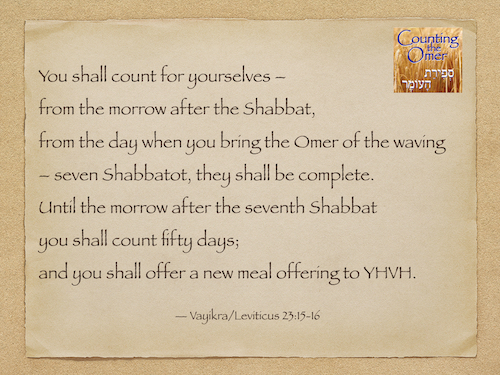
There are 49 days between First Fruits Day, which occurs during the Feast of Unleavened Bread, and the Feast of Weeks (Shavuot or Pentecost). Why does YHVH in the Torah command his pepole to count the seven weeks or 49 days between these two events, with Pentecost occurring on the fiftieth day? The short answer is that Yeshua doesn’t want to marry a spiritual baby. For the long answer, keep reading…
From the Depths of Slavery to a Kingdom of Priests
Every detail in Scripture is for our learning and edification. All the examples of the past are for our learning upon whom the ends of the world are come (1 Cor 10:11; Rom 15:4). Everyday, YHVH is uncovering the prophetic mysteries hidden in the Scriptures that are being revealed to those who diligently seek him by diligently studying to show themselves approved as a workman rightly dividing YHVH’s Word (2 Tim 2:15).
YHVH’s command us to countdown 49 days from First Fruits Day to the Feast of Weeks (Heb. Shavuot; Gr. Pentecoste, Lev 23:15–16) to memorialize the Israelites’ journey from spiritual babyhood to adulthood. During this 49-day count, Israel ascended out of the depths of slavery and suffering in Egypt, was baptized in the Red Sea, and then arrived at Mount Sinai—a place of a spiritual standing before YHVH to become a kingdom of priests (Exod 19:6). It was there that YHVH gave the Israelites his instructions in righteousness—the Torah on Shavuot. This 49-day period represents Israel’s passage from slavery to freedom. They came out of slavery permeated with the leaven, that is, the sins, values, and pagan concepts of Egypt. YHVH instructed them to leave it all behind as symbolized by deleavening their lives during the Feast of Unleavened Bread. After that, YHVH gave Israel 49 days to overcome and to get rid of the impurities of Egypt, and to become the nation of Israel—a holy priesthood and the bride of YHVH. There, at the foot of Mount Sinai, YHVH wanted them to become his ambassadors to this world of the truths of his heavenly kingdom.
The counting of the omer is the story of our lives also. It pictures our going from bondage to the world, the flesh and the devil and coming to a place of spiritual standing before YHVH, so that we can be used of him to advance his kingdom.
It’s a process ordained of YHVH and it’s his pattern that we must follow. There is no escape from this process if we are to be groomed and prepared for use in YHVH’s service.
Why Fifty Days Between the Wave Sheaf Offering and Shavuot?
Fifty is the biblical number signifying complete redemption or liberty. In ancient Israel, all debts were forgiven every seven years. This was called the seven-year cycle. Every seven years, one had to let their land rest; no crops were planted. This was called the land Sabbath. Seven seven-year cycles equaled 49 years. In the Scriptures, we see that seven is the number YHVH uses to signify completion or perfection. Therefore, seven sevens, or 49 years, signified total completion. Seven Sabbaths represents redemption, liberty or rest in its fullest or ultimate sense. The fiftieth year was therefore the year of jubilee when all slaves were set free, all land was returned to its original owners and when all debts were forgiven. If Passover and the Feast of Unleavened Bread signified deliverance from sin (Egypt), then Shavuot, occurring 50 days after the wave sheaf offering during the week of the Feast of Unleavened Bread, symbolizes total redemption, deliverance and victory over sin. How? For us, this occurs through the divine gift and glorious power of the indwelling presence of the Ruach HaKodesh (the Set-Apart Spirit), which Yeshua poured out upon his disciples on the day of Pentecost.
We must recognize this YHVH-ordained process, submit to it and realize what he wants to accomplish in our lives as a result. As we are going through the process, we must keep our eyes on the end goal and keep heading in that direction. Yeshua is that end goal. He is the “end” or “final aim, goal of the Torah” (Rom 10:4). He is “the fulfillment of the law”, that is, he is the full manifestation or fruition of the Torah (Matt 5:17). As such, he is our example to follow. Paul says we are to imitate him—to do what he did (1 Cor 11:1).
The 49 Days Represent a Time of Overcoming and Spiritual Development
When the people of Israel left Egypt, they were immersed or baptized in the Red Sea. This represents the redeemed believer being baptized for the remission of sins at the time of their conversion, and their receiving the Spirit of Elohim. The gift of YHVH’s Spirit is for the purpose of producing within us YHVH’s divine nature. There are seven levels of spiritual growth and development that involve overcoming and equipping, so that we come to a place where YHVH can use us in a special way as his representatives on earth for kingdom outreach.
The seven levels of spiritual development of the divine nature are found in 2 Peter 1:4–8,
Whereby are given unto us exceeding great and precious promises: that by these ye might be partakers of the divine nature, having escaped the corruption that is in the world through lust. And beside this, giving all diligence, add to your faith virtue; and to virtue knowledge; and to knowledge temperance; and to temperance patience; and to patience godliness; and to godliness brotherly kindness; and to brotherly kindness charity. For if these things be in you, and abound, they make you that ye shall neither be barren nor unfruitful in the knowledge of our Master Yeshua the Messiah. [For an explanation of each of the character attributes, see the end notes.]
The fruit of the Spirit must proceed or underlay the gifts of the Spirit. Without love (or the fruit of the Spirit) all the gifts of the Spirit are zero, in YHVH’s eyes (1 Cor 13). The power of the Spirit without the fruits makes for an out-of-control, fleshly or soulish and unloving person.
Divine Empowerment for Kingdom Advancement
Upon conclusion of the 49 days, we arrive at the fiftieth day or the giving of the Torah (in Hebrew, mattan Torah). It is at this point that we receive YHVH’s gift from above—YHVH’s Torah written on our hearts by his Set-Apart (Gr. Paracletos or Comforter, John 14:16–18, 25–26; 15:26; 16:7–8 12–14). The Spirit of Elohim is the One who comes along side of us to aid, help, strengthen and succor us in walking out the Torah. With this divine help, we are able to do that which we could not achieve by our own limited capacities. We receive the gift of true freedom from the world, the flesh and the devil through the gift of the Spirit of Elohim indwelling us, writing his Torah on our hearts thus empowering us to live at a spiritual level beyond what would be otherwise impossible solely through our own human capacity. It is by YHVH’s divine empowerment that we are granted the ability to transcend our human limitations and touch the Divine.
Continue readingHow to Fight the Babylon the Great New Weird Order
With so much evil attempting to force its way into every aspect of our culture as well as into our very thoughts and hearts, how do we stand up against this tide of satanic evil?
Evil comes in many forms: abortion, sexual perversions, destruction of marriage, the drug culture, tyrannical government, euthanasia, confusion about male and female genders, transgenderism, bodily mutilations of all kinds, the rise of the occult and satanism, the culture war against Christian and biblical values, leftism, the rise of globalism and the new world order, the worship of the god of scientism, technocratic mind control, the new age movement, new forms of racism and discrimination against white people, and the list goes on and on.
So what can you do to stop, thwart or avert this tide of evil? Is it useless to attempt to stand against it? What would Yeshua have us to do? What is our biblical model to follow? In this video, we give you some practical suggestions on what YOU can do.
Good (Godly) Versus Bad (Demonic) Music

And so it was, whenever the spirit from God was upon Saul, that David would take a harp and play it with his hand. Then Saul would become refreshed and well, and the distressing spirit would depart from him. (1 Sam 16:23
1 Samuel 16:23, The spirit from Elohim.YHVH sovereignly has the power to use anyone or anything to accomplish his purposes including evil spirits. This evil spirit was a judgment against Saul for his rebellion against YHVH’s instructions which was a form of witchcraft (1 Sam 15:23–24). Saul sought power, fame, wealth and glory at the expense of obeying YHVH (1 Sam 15:22) as did Balaam the false prophet. Thus Saul was inclined toward the dark side and, as a result, attracted evil spirits. As a result, YHVH, sent him a troubling spirit to agitate him back to the good side as represented and evidenced by the David’s harp music. When Saul felt better after hearing this music, he should have repented of his sinful ways and come back to Elohim, but he did not, since his heart was predisposed and inclined toward evil. Thus, YHVH used the evil spirit to goad and provoke Saul thus putting him to the test to see whether he would return to the right path. Obviously he did not repent but continued in the downward spiral of evil which led him acquiescing to a murdering spirit eventually to his consulting the witch of Endor resulting in his ultimate and untimely death as well as the erasure of his lineage.
Harp…refreshed…distressing spirit would depart.Johann Sebastian Bach declared that the sole aim and purpose of all music should be nothing else but the glory of Elohim and the refreshment of the spirit. Evil spirits do not like quality much less godly music. YHVH created Lucifer to be musical (Ezek 28:13), but when he rebelled, his mind along with his musical tastes and abilities became twisted and perverted, which is why quality music is anathema to an evil spirit, for Satan is the father of it ungodly music. From evil and twisted minds comes dark forms of music along with perverted lyrics and discordant “rhythms”. Most modern music (both rock and classical) comports with this genre of “music”. Science has even discovered that the patterns of the sound waves that such music makes is confusing, disorganized and senseless. One can only imagine the physiological impact of the sound waves that such music has on the cells of the brains of its listeners. Apparently, such music also has a deleterious effect on plants that are subjected to it compared to quality music. Conversely, the Bible reveals that quality, godly and uplifting music brings on the anointing of YHVH (2 Kgs 3:15), as well as the prophetic word of Elohim (1 Chron 25:1–3; 2 Chron 20:14). Moreover YHVH inhabits or is enthroned on the praises of his people (Ps 22:3), while at the same time such music repels evil spirits as was the case when David played the harp for the demonically oppressed Saul. Praise and worship music can even defeat the militaristic enemies of YHVH’s saints (2 Chron 20:21–23) Thus, the playing of good music is a form of spiritual warfare, while evil music attracts evil spirits and those who are inclined toward the dark side.
YHVH Is Raising Up John the Baptist–Type Preachers to Prepare the Way for Yeshua

John was no reed shaking in the wind—and neither are those who are now coming in that spirit to prepare the ways for Yeshua the Messiah’s second coming!
The Gospels contain many curious, arcane and cryptic statements by Yeshua that invite the reader to ponder and reflect on in order to fully understand and appreciate them. Matthew 11:7–12 is one such statement.
As they departed, Yeshua began to say to the multitudes concerning John: “What did you go out into the wilderness to see? A reed shaken by the wind? But what did you go out to see? A man clothed in soft garments? Indeed, those who wear soft clothing are in kings’ houses. But what did you go out to see? A prophet? Yes, I say to you, and more than a prophet. For this is he of whom it is written: ‘BEHOLD, I SEND MY MESSENGER BEFORE YOUR FACE, WHO WILL PREPARE YOUR WAY BEFORE YOU.’ “Assuredly, I say to you, among those born of women there has not risen one greater than John the Baptist; but he who is least in the kingdom of heaven is greater than he. And from the days of John the Baptist until now the kingdom of heaven suffers violence, and the violent take it by force.
This statement of Yeshua is a very telling commentary how he viewed the mainstream religious leaders of his day. This was juxtaposed against his view of John the Baptist, who, though he was of priestly lineage, left the existing religious establishment and went into the wilderness to prepare the way for the coming Messiah.
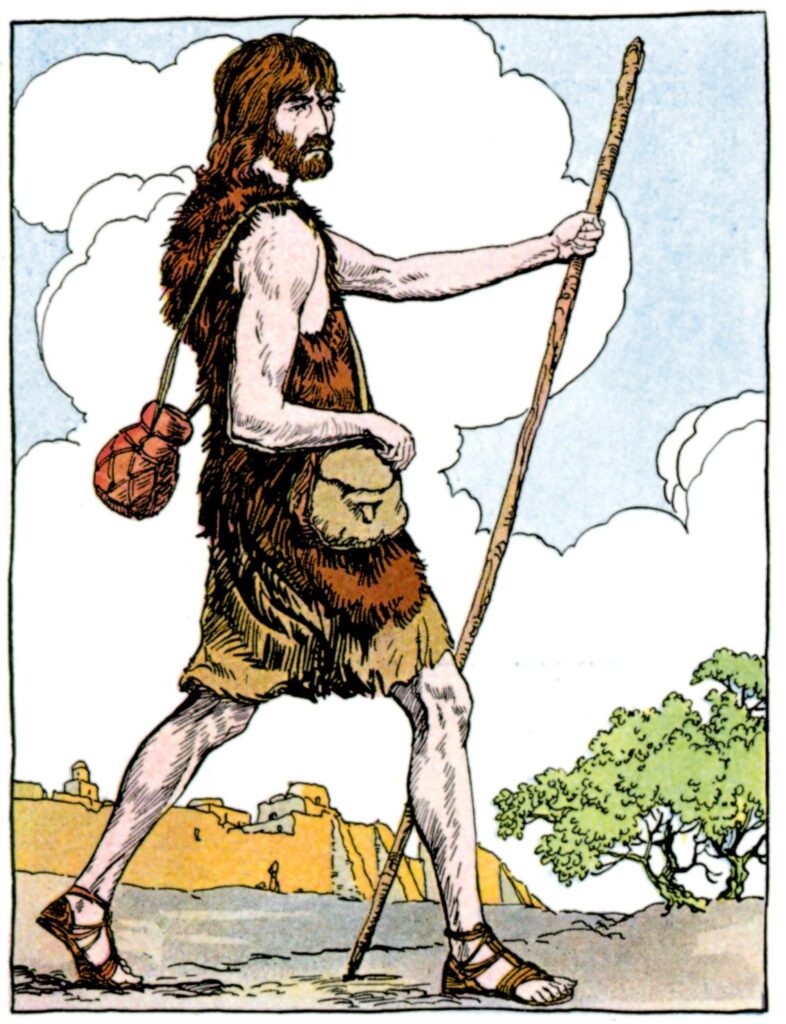
In his Matthew chapter eleven statement, Yeshua also predicts that a whole new genre of preachers would arise who, unlike the typical soft-spoken preachers of mainstream religion, would be violent and forceful in their demeanor and approach. Violent in the sense of confronting the religious establishment and the lukewarmness and sin of the people as he forcefully advanced the agendas of the kingdom of heaven against the opposing forces of a reluctant and recalcitrant spiritual environment.
With regard to John, who was a spiritual pioneer and pacesetter for this new breed of preacher, and who would enter the placid and staid religious waters of his day like a hurricane, let us consider the implications of this as well as Yeshua’s view of John. John’s background is part of the context of this iconoclastic individual, which we will now view under a magnifying lens.
To start with, John’s father, Zachariah, was of such a priestly status that he was allowed to minister in the inner portions of the temple itself. Yet John left this system to fulfil a ministry mission that was even greater than that of his father. Although John likely did not realize it at the time—for he was simply following the leading of the Spirit—he, by Yeshua’s own declaration, was to become the greatest prophet of all time up until then. To fulfil that divine mission, John had to exit the existing religious system and its status quo into which he was born, and execute that mission from outside of that system. Why? Because the Jewish religious system of the day would not, never did, and still does not recognize Yeshua as the Messiah. In fact, they viewed him as a threat to their religious tradition not to mention their secure positions of power and wealth, and on numerous occasion, they even tried to murder him. Eventually, they finally succeeded.
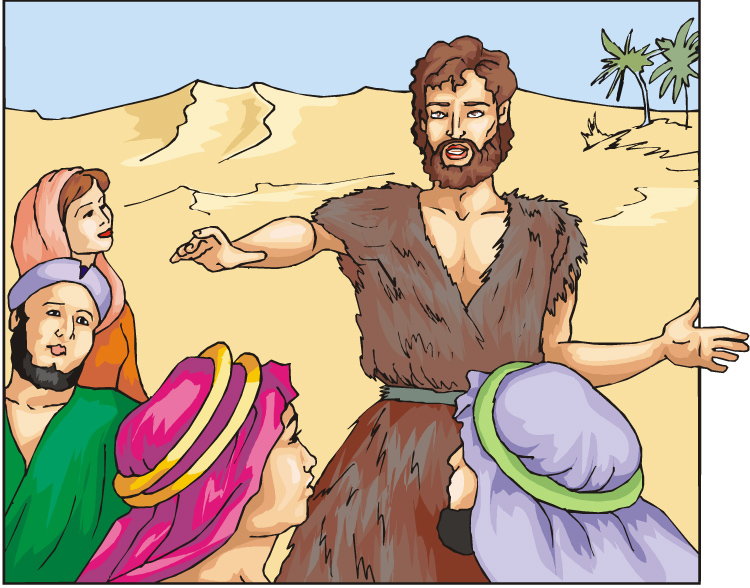
YHVH called and raised up John, who was a special vessel, to stir the pot of the religious system of his day in hopes of waking up his few saints who were trapped in that system. It was John’s divine mission to put out a forceful call to those who had ears to hear to exit the Babylonian system of that day in preparation to meet Yeshua the Messiah. (YHVH is doing similar work in our day through similar type people as per the prophecy of Malachi chapter four.)
It was against this backdrop of constant religious antagonism and persecution that John executed his mission to prepare the way for Yeshua the Messiah, which involved clashing with the rich, powerful religious leaders of his day, who were concurrently in league with both the political and economic forces in control of that geographical region. The Truth and light of Messiah was literally confronting the satanic darkness of man’s religious, economic and political agendas. To use a jungle warfare term, John was the point man in this cosmic conflict, thus he took the incoming fire. To be sure, this was no place for a spiritual neophyte or weak-kneed, limp-wristed pansy in the pulpit. This was a struggle to the death—a literal clash with demonic god-like Titans. Therefore, YHVH raised up a man with a powerful background for a tough assignment. John was immersed in the Spirit while still in the womb, and Scripture deems his parents to be spiritually faultless. His father was of high repute as a Levitical priest, plus John was the cousin of Yeshua the Messiah himself. This was no average family even in human terms. No. John was no spiritual lightweight in the boxing ring of religion. Out of the fiery forge and crucible of his familial background come a mighty sword of a man who YHVH raised up to lay a spiritual ax to the root of the religious tree of his day and to the man-made system that was leading people astray and making of none-effect the Word of Elohim by their traditions. John was no pansy, no weak reed shaking in the wind, no well coiffed, tailored suit wearing pastor in the pulpit speaking man-pleasing, flattering and ear-tickling words to pew warmers religious addicts sitting passively and comfortably in padded benches in neat little rows beneath stained glass windows getting their weakly religious fixes. No! YHVH called and commissioned John, who was a rugged man for a rugged job to prepare the way for the Messiah, who himself would carry this battle against the religious system to an unprecedented level in an effort to call out YHVH’s true followers, who would worship Elohim in Spirit and in Truth instead of merely playing religious games.
This now brings us to Yeshua’s cryptic, slightly arcane and even a bit sarcastically-tinged statement about John and those who followed him about a reed shaking in the wind.
What is a reed shaking in the wind anyway? It is a weak blade of grass that moves with the slightest breeze. In human terms, it is someone who puts their finger to the wind to determine its direction and then bends accordingly. Such a person follows the popular currents of thought and the prevailing and popular mores or zeitgeist (or spirit of the age) of the time and accommodates himself and his message accordingly to curry the favor and popularity of the masses. These are the kind of leaders we see in the mainstream Christian church system of our day. They are often well coiffed, well-dressed and wear soft clothing as part of their marketing strategy, and speak soft words so as not to offend “the giving units”. Few, however, preach repentance. Fewer yet preach the gold standard of biblical righteousness, which is YHVH’s Torah-Truth of which Yeshua the Messiah was the living, walking breathing personification and our example to follow.
Yes, John came to lay the ax to the status quo of a religious system of his day that was keeping people in a state of being spiritually obese, comfortable, happy, paying their dues, non-questioningly and spiritually lukewarm.
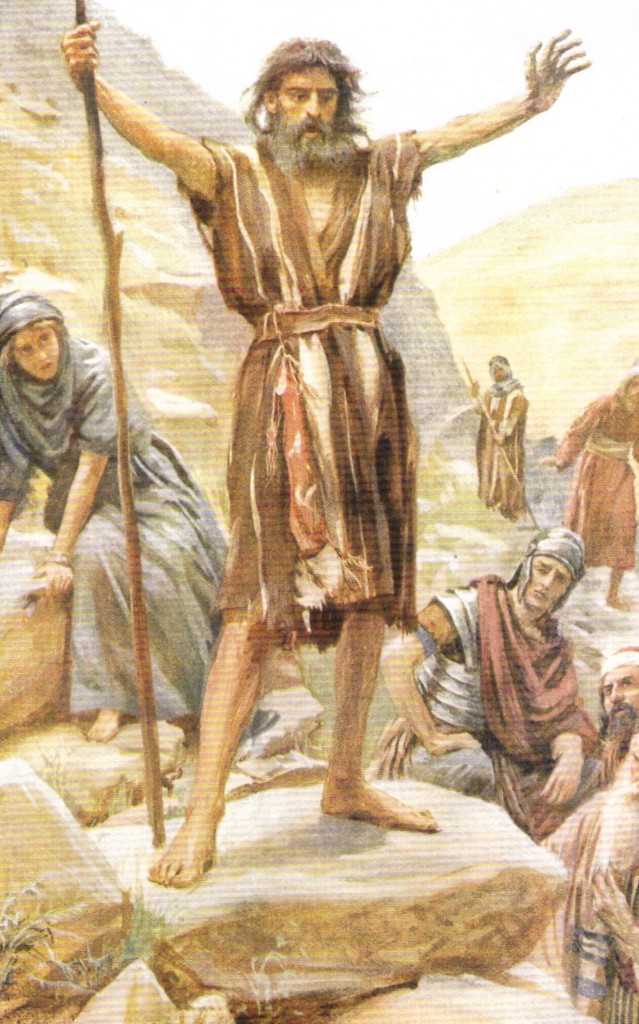
Yes, John was popular. Many if not most of the inhabitants of Judea made the long, hot and arduous trek down from the Judean mountains to the lowest spot on earth (an apt geographical representation of the current state of the religious system of that day…and ours) into the Jordan River Valley near the Dead Sea (another apt geographical description of the religious system of John’s day…and our day as well) to hear this goat-skinned clad, locust and honey-eating and wild-eyed preacher man. When they arrived, did he tickle their ears with gentle happy, happy-talk religious platitudes? Did he tell them that “Come to Jesus because he has a wonder plan for your life?” Or, “Come to Jesus and he’ll help improve your self esteem.” Or, “Say a prayer, receive forgiveness and go to church and pay your tithes, and now that you’re once saved always saved, just go and stand on the street corner, while waiting for the rapture bus to take you to heaven before all the you-know-what hits the proverbial fan.” Or “Come to Jesus and if you buy my how-to books and videos, then I’ll show you how he’ll make you healthy and wealthy here and now on demand.” No! This was not even close to John’s message. Rather it was…
[W]hile Annas and Caiaphas were high priests, the word of Elohim came to John the son of Zacharias in the wilderness. And he went into all the region around the Jordan, preaching a baptism of repentance for the remission of sins, as it is written in the book of the words of Isaiah the prophet, saying: “THE VOICE OF ONE CRYING IN THE WILDERNESS: ‘PREPARE THE WAY OF THE LORD; MAKE HIS PATHS STRAIGHT. EVERY VALLEY SHALL BE FILLED AND EVERY MOUNTAIN AND HILL BROUGHT LOW; THE CROOKED PLACES SHALL BE MADE STRAIGHT AND THE ROUGH WAYS SMOOTH; AND ALL FLESH SHALL SEE THE SALVATION OF ELOHIM.’ “Then he said to the multitudes that came out to be baptized by him, “Brood of vipers! Who warned you to flee from the wrath to come? Therefore bear fruits worthy of repentance, and do not begin to say to yourselves, ‘We have Abraham as our father.’ For I say to you that Elohim is able to raise up children to Abraham from these stones. And even now the ax is laid to the root of the trees. Therefore every tree which does not bear good fruit is cut down and thrown into the fire.” (Luke 3:2–9)
In the last days, prior to Yeshua’s second coming, if we correctly understand the end time prophetic implications of the Book of Malachi chapters three and four, YHVH will raise up John the Baptist–type preachers, who will be coming in the spirit of Elijah, and who will be preaching a hard and unpopular message. They will be warning YHVH’s people to repent of sin, and return to the ancient spiritual paths as taught by the biblical fathers of the Christian faith by getting back to YHVH’s Torah-Truth. This will be the unpopular and disturbing message of, to put it in modern vernacular, “to turn or burn” (see Mal 4:1, 3 and 6b). May those who have ears to hear, and who are children of the light, hear and understand the times and seasons in which we are living (1 Thess 5:1–10).
On Finding Godly Spouses for Our Children

Genesis 34:1, Dinah…went out. The lure of friendship with the world is a powerful one. Youth are especially vulnerable to the attractions of the world, since it offers things that are new and exciting. But this is not always for their ultimate good as Dinah soon and sadly discovered.
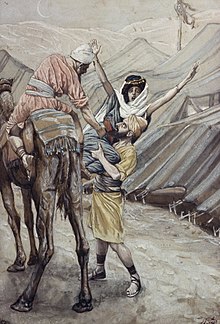
Dinah’s being drawn to friends among the heathen is what caused this whole sorry affair between the sons of Jacob and the inhabitants of Shechem resulting in Dinah’s kidnapping and rape and the massacre of the Shechemites. James the apostle warns us, “Ye adulterers and adulteresses, know ye not that the friendship of the world is enmity with Elohim? Whosoever therefore will be a friend of the world is the enemy of Elohim” (Jas 4:4). Similarly, John states, “Love not the world, neither the things that are in the world. If any man love the world, the love of the Father is not in him. For all that is in the world, the lust of the flesh, and the lust of the eyes, and the pride of life, is not of the Father, but is of the world” (1 John 2:15–16). The lure of the world’s acceptance is a dangerous one that leads one down a slippery slope spiritually as Paul opines. “Do not be deceived: Evil company corrupts good habits” (1 Cor 15:33). Elsewhere, Paul warns the young Timothy to “Flee youthful lusts” (2 Tim 2:22). If the enticements of the world weren’t such a difficult temptation to resist, then he wouldn’t have urged young people to flee them!
Furthermore, YHVH, our loving Heavenly Father wouldn’t be urging his people to come out of the world (Rev 18:4; 2 Cor 6:14–17). Moreover, Solomon, the wisest man who ever lived, and who knew something about the alluring power of sexual and lustful enticements, dedicates the first seven chapters of the book of Proverbs to warning against it. He urges young people to follow the path of wisdom, truth and the fear of Elohim by fleeing the ways of the perverse woman—a metaphor for evil in its every form.
The problem is that most young people feel they are powerful enough to resist the temptations of the world, the flesh and the devil—that they’re an exception to the rule and immune. Sadly, this is pride based on naiveté. As the Scriptures teach us, pride comes before a fall, which results in shame (Prov 16:18; 11:2). “There is a way that seems right to a man, but the end thereof are the ways of death” (Prov 14:12; 16:25). “He who thinks he stands, take heed lest he fall” (1 Cor 10:12). Dinah would have been better off had she heeded this advice.
So how could Jacob have protected his children from worldly influences? After a certain point when young people become adults, this is no longer possible; they have to figure things out for themselves and to make their own choices one way or the other. Until then, parents can somewhat shield their children from the evil influences of the world within the protective confines of the family structure, even as they are inoculating them against the world’s ungodly mores by laying under them a strong, biblically-based spiritual foundation of Truth. After that, however, the young and tender plants have to leave the protective greenhouse of the family and face the exposure of the outside elements—the wind, cold, rain, ice, snow as well as competition from other plants, where they will either stand firm against these adverse forces, or will, to one degree or another, succumb to them.
It is a particular and difficult problem for young people who are raised in godly families to find godly spouses. If they are not part of a spiritual community where the “fishing” is good, then they are forced to go searching for marriage prospects in the world around them. This is a potentially dangerous proposition and a gamble at best. This was likely the case with Dinah, and it turned out badly for her. For this reason, both Abraham and Isaac insisted that their children NOT seek marriage partners from among the Canaanites around them. They went to great lengths to find godly spouses for their children. Jacob would have been well-advised to do the same. Perhaps, however, this was not an option for him after his difficult experience with Laban and the vow he had just made with his uncle at Mizpeh not to cross the Jordan River en route to Babylonia. It seems that this would have precluded Jacob from seeking wives for his children elsewhere, leaving them no choice but seek such among the local heathen populace. Evidently, Dinah’s brothers intermarried with the local girls, which may have contributed to the Israelites’ eventual apostasy and enslavement in Egypt.
Whatever the case, it is not easy for anyone to remain faithful to Elohim in this evil world. If it is difficult for parents to resist the forceful currents of spiritual declension short of divine intervention and empowerment, then how much more so for their children after them?! Many godly people have been asking this same question for a long time as we read in the Gospels,
And those who heard it said, “Who then can be saved?” But He said, “The things which are impossible with men are possible with God.” (Luke 18:26–27)
Then one said to Him, “Lord, are there few who are saved?” And He said to them, “Strive to enter through the narrow gate, for many, I say to you, will seek to enter and will not be able.” (Luke 13:23–24, emphasis added
Genesis 34:9, Make marriages with us. After the Dinah and Shechem incident, the local Canaanites wanted to intermarry with Jacob’s children and steal their inheritance (Gen 34:23). It is the desire of worldly people to pollute and desecrate YHVH’s set-apart people. The world isn’t content to live and let live—to leave the saints alone. It pollutes and destroys everything it touches wants by pulling those of a higher spiritual level down to its low spiritual level. Jacob and his sons, however, remained firm and refused to assimilate with the Canaanites.
Had Jacob succumbed to the alluring offers of the devil, he would have lost his spiritual standing with Elohim as well as his future, promised and covenantal inheritance.
The devil offered Jacob the small reward of temporary peace and prosperity by making assimilating alliances with the heathens in exchange for Jacob’s birthright. Esau made this mistake years earlier, and Jacob knew better than to fall for the enemy’s lies.
The devil tempted Yeshua in the same way after his forty day fast in Matthew chapter four. Satan promised Yeshua temporal and immediate fame, glory and prosperity if he would submit to him. To do so, Yeshua would have forfeited his future higher glory. Instead Yeshua chose the better reward of the delayed gratification that his Father offered him as opposed to the instant carnal gratification the devil offered.
We too must follow the example of Jacob and Yeshua and resist the enemy’s overtures that appeal to our base carnal nature. Instead, we must aggressively fight off the enemy who wants to steal and destroy our inheritance and kill us in the process.
No good can come from intermarrying literally or spiritually with the heathen!
Be not deceived: Evil company corrupts good habits. (1 Cor 15:33)
Ye adulterers and adulteresses, know ye not that the friendship of the world is enmity with Elohim? whosoever therefore will be a friend of the world is the enemy of Elohim. (Jas 4:4)
Be ye not unequally yoked together with unbelievers: for what fellowship hath righteousness with unrighteousness? and what communion hath light with darkness? And what concord hath Messiah with Belial? or what part hath he that believeth with an infidel? And what agreement hath the temple of Elohim with idols? for ye are the temple of the living Elohim; as Elohim hath said, I will dwell in them, and walk in them; and I will be their Elohim, and they shall be my people. Wherefore come out from among them, and be ye separate, saith the Lord, and touch not the unclean thing; and I will receive you, and will be a Father unto you, and ye shall be my sons and daughters, saith the Lord Almighty. (1 Cor 6:15–18)



